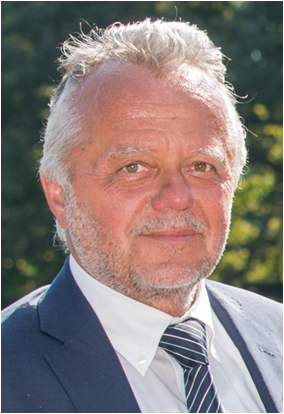For 50 years now, students in Austria have been able to select Computer Science as a major. More precisely: at the JKU. Karl Hoffelner was one of the very first students.

Question: As one of the first students in the program, you are practically one of the "pioneers". Why did you decide to study Computer Science 50 years ago?
Karl Hoffelner: The pivotal point for me was that educational computer science was also part of the major in Computer Science. I ended up changing my original plan to pursue teacher education studies. Using computers in education - both at schools and in vocational training - seemed extremely interesting to me!
Question: What expectations or ideas for a career did you have when you began your studies?
Karl Hoffelner: The expectations were fairly straightforward! The idea, however, was that there were definitely perspectives when studying computer science. You could say that we were guinea pigs. The first three semesters of the program was pretty much just mathematics and physics
During the fourth semester and afterwards, the program focused on computer science (mathematics and logical principles), design, organization and operating IT systems, programming, as well as educational computer science in particular, including the didactics of computer science, information psychology, teaching technology and programmed instruction. In terms of professional pursuits, I thought I would go into education and focus on computers.
Question: How did your professional career develop?
Karl Hoffelner: I worked as an academic and research assistant at Feoll (research and development centers for objective teaching and learning methods) in Paderborn at the Institute for Educational Informatics between 1974 and 1983. It was there that I wrote my dissertation titled "Ein computergemanagtes Fernstudiensystem (CMFS)".
In 1984, I started working at the Digital Equipment Corporation (DEC) education center in Munich. In addition to developing interactive information systems, I managed many school education projects for Germany, Austria, and Switzerland. The basis for this was one of the first multimedia PCs called IVIS (interactive information system).
In 2000, I became a sales manager at HERDT Verlag für Bildungsmedien (Bodenheim, Germany), and, in addition to the book Aufbau neuer Geschäftsfelder which focuses on online media and interactive learning programs in teaching computer science, I was also active in continual education.
I retired in 2016 and currently reside in Zell am See.
Question: In your opinion, what has been the biggest innovation in the field of information technology over the last 50 years?
Karl Hoffelner: Mostly the technological development, computer performance (speed, storage capacity, size), and creating this medium to be easily accessible for everyone to use.
Question: Looking back, what would you have thought impossible at the time?
Karl Hoffelner: Actually, I thought anything is possible however, the rapid rise technological development was surprising.
Question: Half a century later, there is a new generation of pioneers at the Johannes Kepler University Linz launching the "Artificial Intelligence" program. The program is unique in Europe - what advice do you have for students?
Karl Hoffelner: This is essentially a very interesting topic, although I would like to point out that I attended lectures in Artificial Intelligence in 1973 as part of the program in educational computer sciences. An awareness that a computer is a machine and not a human being is most fundamentally important!








